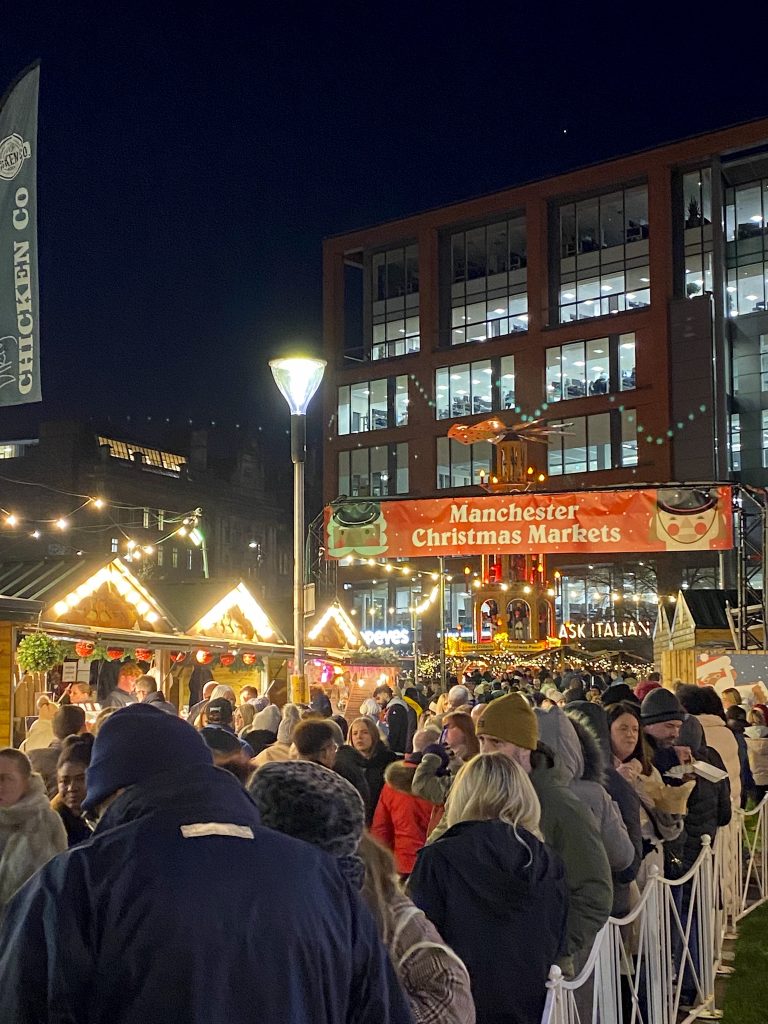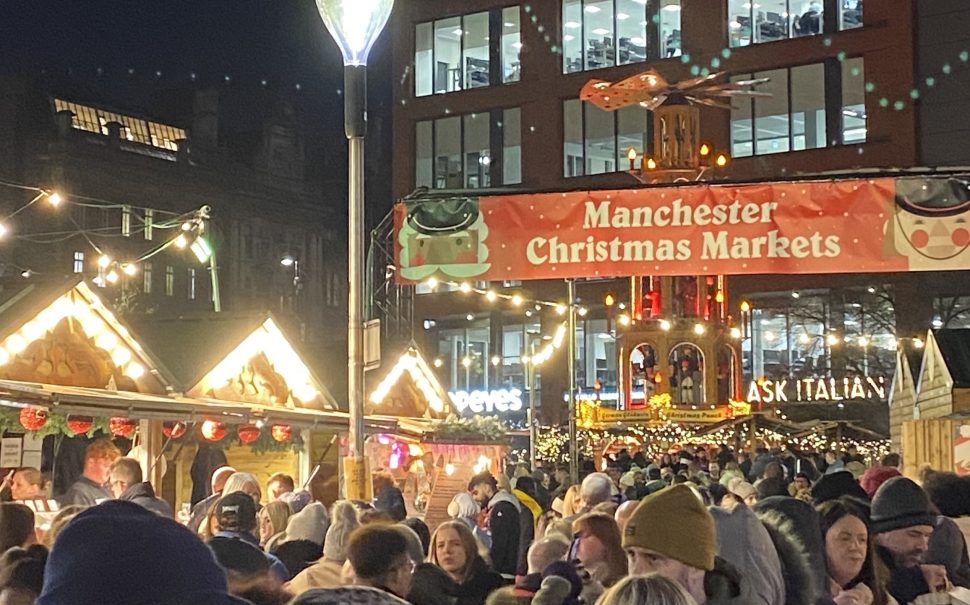The Christmas markets are back and bigger than ever. But with traders forced to put their prices up and customers getting less for their money, can people still afford to visit them?
It’s 2017 on a cold, dark December weekday. You’re in the heart of Manchester in Albert Square and you’ve just bought a loaded hot chocolate for £2.
Flash forward to 2023 and it’ll cost you nearly a fiver. One of the cheapest sweet treats at the markets has more than doubled in price, starting at £4.50.
Welcome to the Manchester Christmas Markets.
This year there are more than 225 stalls transforming the city centre into a festive winter wonderland. Spread across ten streets, Manchester’s Christmas Markets are the biggest in the UK, running to 21 December. The tradition started a quarter of a century ago and since then people have travelled from all over the world to experience them. They have even been named Europe’s favourite Christmas Markets for 2023.
With so many stalls to browse, foodie favourites and handmade gifts, is it even Christmas without a visit to the markets? But for many, it’s difficult to indulge in the festive fun without factoring in the prices. In fact, the only magic many consumers have noticed is the increasing prices over the last few years.
And since the stalls opened on November 10, people have taken to X (formerly Twitter) to share their thoughts on the commercialisation of Christmas, with many people divided. Some were feeling outraged by food prices, while others were still impressed by what the Manchester markets had to offer.
The Manchester Evening News (MEN) has been tracking the prices of popular items each year, estimating an average increase of 50p across much-loved festive favourites like the Yorkshire pudding wrap. Delicacies like bratwurst, loaded hot chocolate and mulled wine have also increased consistently since 2021.
This year inflation has arrived uninvited and dressed as The Grinch, undermining the fun for everyone. While the inflation rate has gone down from last year, wages have only just started to balance out. Data from the Office for National Statistics shows wages rising at an annual rate of 7.8% between June and August 2023, with price growth at 7.1%. Although these figures are optimistic for consumerism in 2024, people have naturally been more cautious with their spending. As the price for essential items goes up and disposable income goes down, some stall owners have already noticed a difference in trade this year.
Popsters stall owner Nancy Fowler said: “I do find that I am grafting a bit harder this year to get the sales in.”
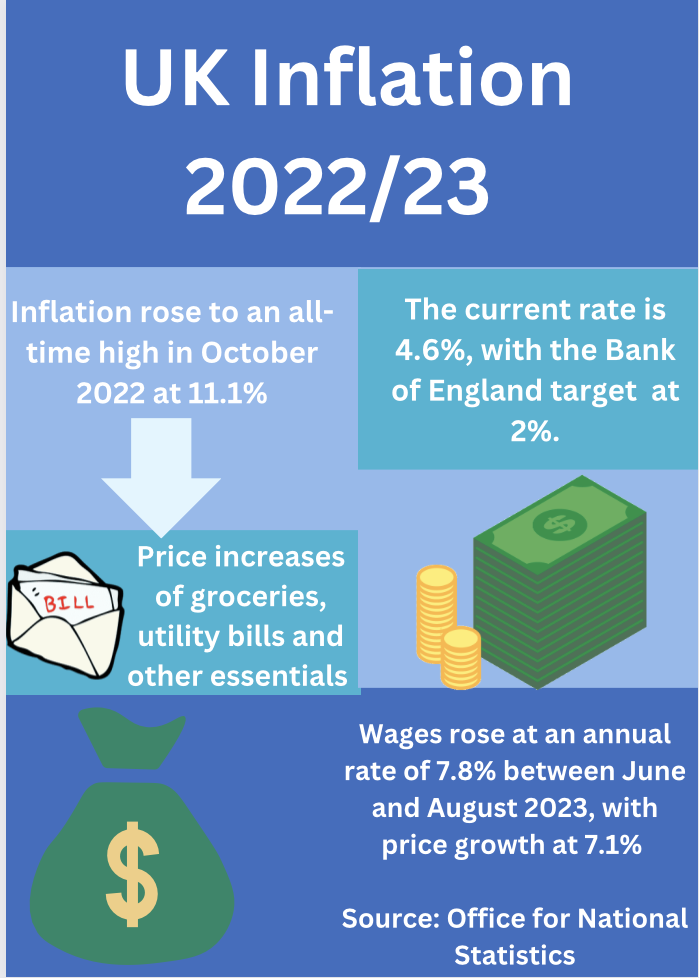
So are the Christmas markets good value for money? Let’s take the bratwurst, a Christmas market staple. It’s nearly doubled in price, increasing from £4.50 in 2017 to £8 in 2023. If you’re hoping for any additional toppings then you’re easily into double figures. The bratwurst prices in the North West (particularly Manchester and Liverpool Christmas Markets) are the highest in the UK outside of London, where prices start at £9 at Winter Wonderland.
Similarly, the deposit for Manchester’s iconic and much-loved mugs were £2.50, compared to £3 in 2022 and £3.50 this year. It’s nearly a tenner (£9.50) if you fancy a small mulled wine in a festive mug. Of course, if you return the mug you get the deposit back, but you might as well keep it rather than queue up again! It seems the novelty of the Christmas markets is priceless, but nothing is getting cheaper, that’s for sure.
Fowler, who sells coasters of famous album covers and has been trading for ten years, reported the cost of living crisis as something she takes into consideration for the future of her business. Consequently, she’s increased her prices by 50p since last year, from £4 each in 2022 to £4.50 each in 2023. But for under a fiver her products are still a hit with customers.
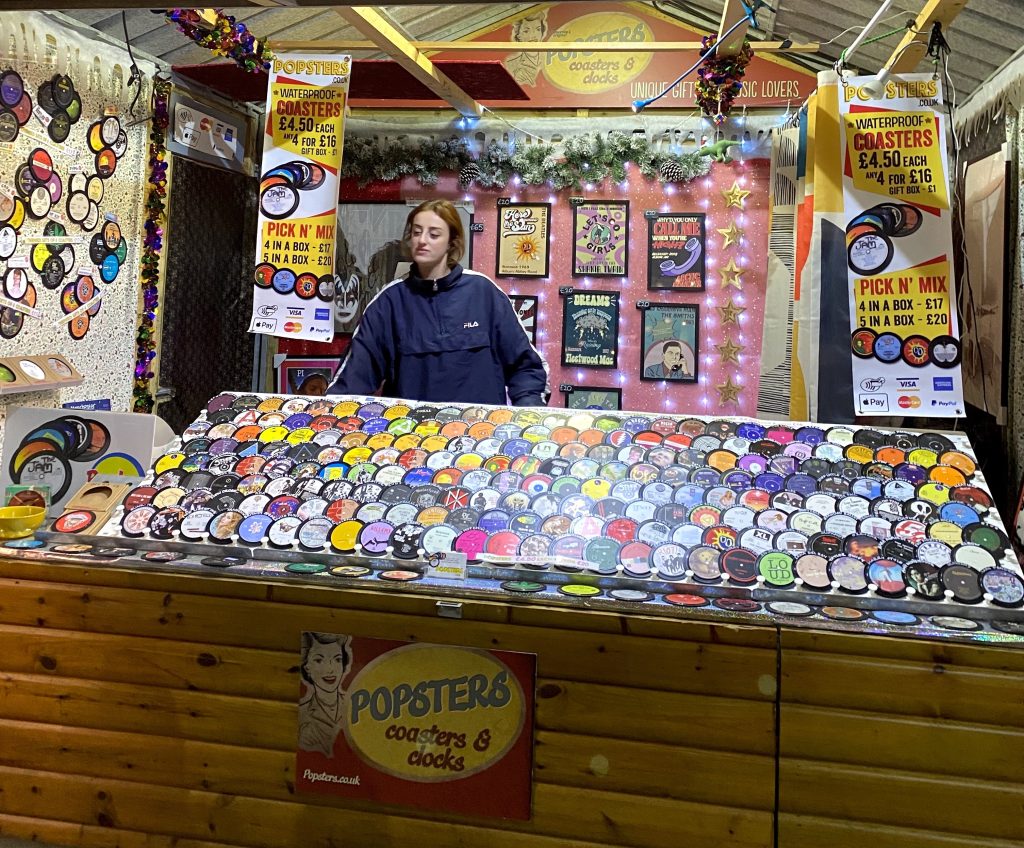
She said: “As the weeks go by it is getting busier so I think people are holding on a little bit, maybe checking to see if they can afford the Christmas presents. Especially with the stuff I’m selling, it’s not an essential, it’s a cute novelty, so it makes sense that people wouldn’t want to spend money, but they still seem to be.”
On the other hand Jules Hamnery, who sells independent novelty hats by the brand Tiger Mountain, said he was not concerned about the cost of living crisis impacting the business.
He said: “I think everyone has seen an increase and nothing is getting easier but the cost of living crisis doesn’t seem to be affecting our sales too much because these are a luxury item.
“Fortunately we’ve got quite a reputation so we have a lot of repeat customers and people coming back to us spreading the word. It hasn’t had an impact on our business because it is well-known, well-named and well built. It’s still very strong.”
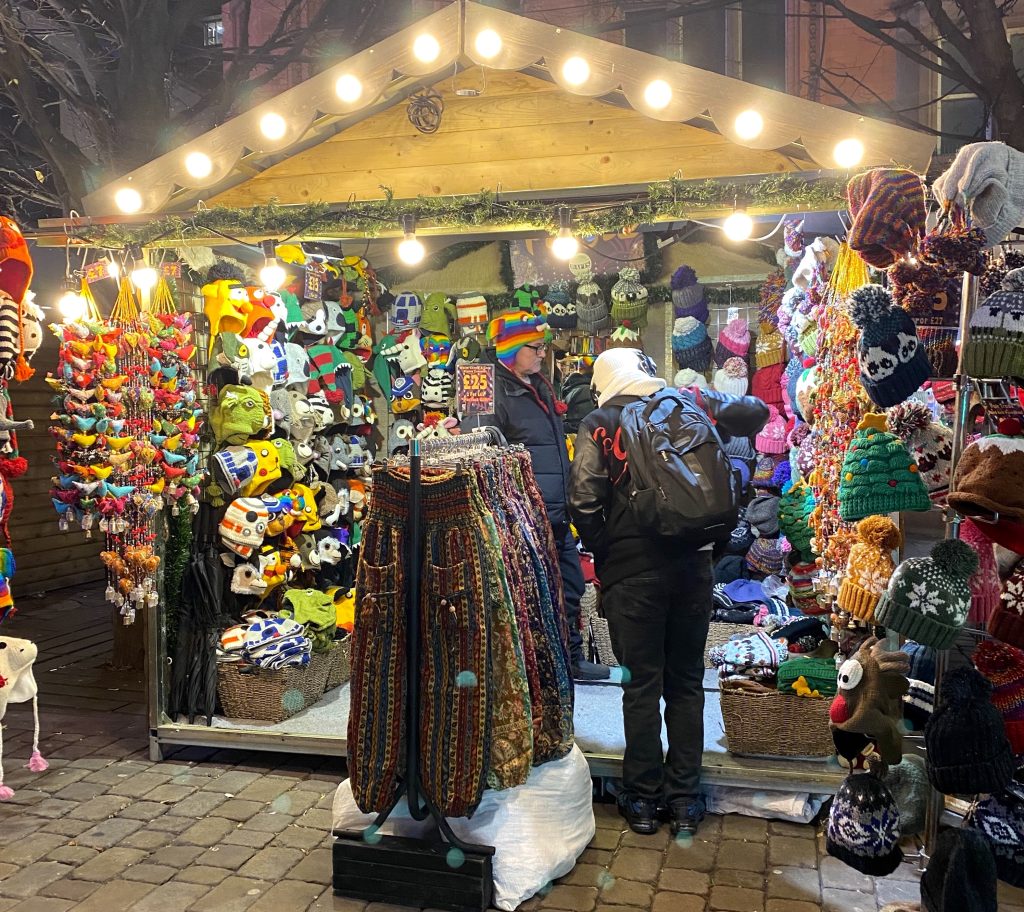
Other factors, like the Covid-19 pandemic and the lack of trade for 2020, as well as Brexit, have also contributed to the challenges traders face.
David Sawyer, who works at The Cheshire Cheese stall, reported the business was more significantly affected by Brexit and the subsequent difficulties with sourcing produce than the cost of living crisis.
He said: “With the cost of living everything has gone up. We’ve gone up about 30% on the price of goods on what we’re selling to you, so you’re paying more as a customer. The price has gone up compared to other things, so it doesn’t hit people as hard.
“This is a luxury item so people can either afford it or they can’t, whereas fuel and other things are going to affect their pockets more because they need it, but you can decide whether you want cheese or not. People buy this if they can afford to, if they can’t afford it then they won’t buy it.”
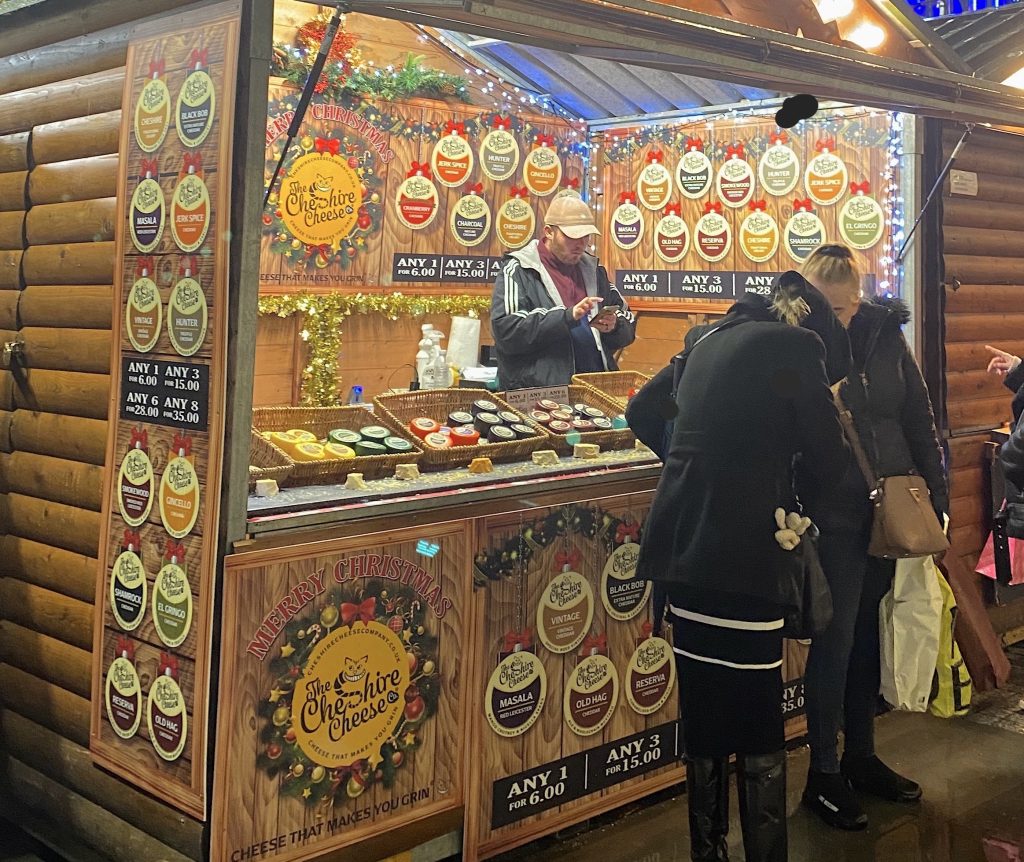
As spending habits change with the convenience of buying things online, as well as the option to skip the hectic crowds at the markets, some traders have noticed people browsing their stall and either not buying at all or buying later, suggesting more people are avoiding impulsive purchases or thinking about whether they can afford to spend the money before committing to the purchase.
Fowler added: “I have noticed a slight dip in sales but not in my online sales though, I feel like they have been pretty consistent compared to last year. People often browse and take a business card without buying anything and then I’ll see the purchase come through later that evening or the next day, but I’m not sure why that is.”
Albert Square, usually at the heart of the Christmas markets, hasn’t welcomed stalls for the past two years due to the ongoing construction of the town hall. Fowler, whose stall is pitched on Market Street, outlined the difficulties caused by traders being randomly allocated stalls each year by Manchester city council, without being able to request a location in advance.
She said: “They change where the markets are every year especially in Manchester and I think depending on what street you’re on it has a massive impact. On Market Street people are walking back and forth to shops and train stations so they might just look over.
“It does feel like a lot of people aren’t intentionally shopping, they’re just looking, which obviously is an issue for someone who literally needs people to buy things. I do get why people are being a bit more thrifty with their spending but as a whole it’s not been too different from last year.”
Despite the annual price increases, the crowds of people visiting the markets mean businesses can both sustain and enjoy trading. Cost of living crisis or not, it seems the future of the Manchester’s Christmas Markets remains bright.
